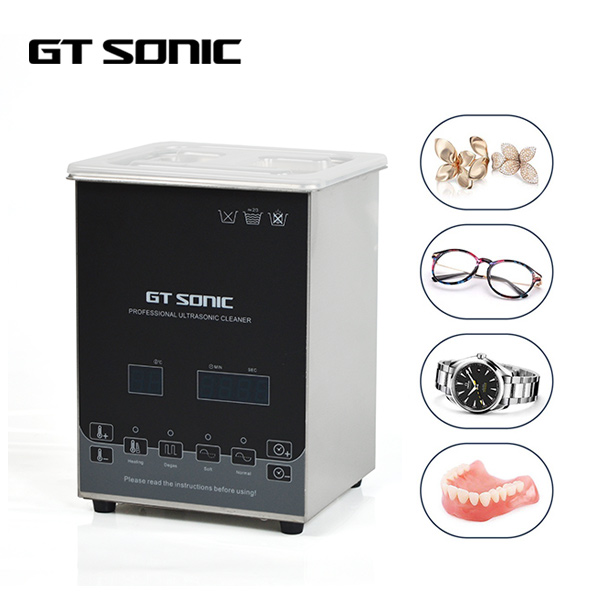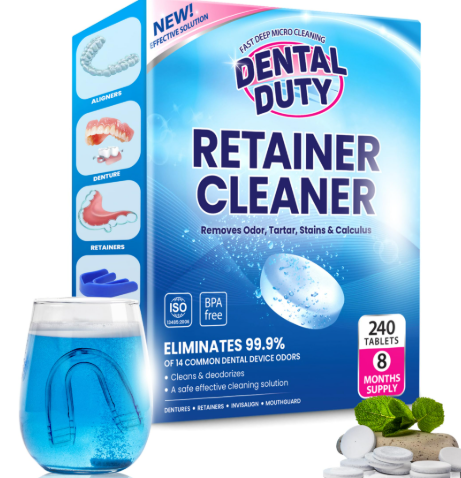How to clean your mouth guard: Ultrasonic denture cleaner VS. Denture cleaning table
2025-12-31
Maintaining your mouth guard or dentures in a clean, hygienic condition is essential for both oral health and comfort. When it comes to cleaning these dental appliances, two popular methods stand out: denture cleaning tablets and ultrasonic denture cleaners.
Maintaining your mouth guard or dentures in a clean, hygienic condition is essential for both oral health and comfort. When it comes to cleaning these dental appliances, two popular methods stand out: denture cleaning tablets and ultrasonic denture cleaners. Both of these cleaning methods are effective, but understanding their differences can help you choose the one that best suits your needs. In this guide, we will compare the two cleaning methods and offer useful tips on how to clean your dentures with an ultrasonic cleaner.
what is a ultrasonic cleaner?
-what is the mechanical process of a ultrasonic cleaner?
-what is a ultrasonic cleaner used for?
Denture cleaning table VS. Ultrasonic cleaner for dentures
-Are ultrasonic cleaning machine better than tablets?
-Do ultrasonic dental cleaners need tablets?
How to clean dentures with ultrasonic cleaning?
-Can you use denture tablets in an ultrasonic cleaner?
-What liquid to use in ultrasonic cleaner for dentures?
-How long to ultrasonic clean dentures?
Best Denture Ultrasonic Cleaner Manufacturers 2025
Conclusion
What is a Ultrasonic Cleaner?
An ultrasonic cleaner is an electronic device that uses high-frequency sound waves to clean various objects, including dentures, mouth guards, jewelry, and even medical instruments. These sound waves create microscopic bubbles in the cleaning solution, and when these bubbles collapse, they generate tiny shockwaves that dislodge dirt, bacteria, and other debris from the surface of the object being cleaned.

What is the Mechanical Process of an Ultrasonic Cleaner?
The mechanical process of an ultrasonic cleaner involves cavitation and high-frequency sound waves to clean objects. Here’s how it works:
Generation of Sound Waves: The ultrasonic cleaner generates high-frequency sound waves (typically between 20 kHz and 40 kHz).
Cavitation: These sound waves cause rapid fluctuations in pressure within the cleaning solution, forming microscopic bubbles.
Collapse of Bubbles: When these bubbles collapse, they generate shockwaves that can gently remove dirt, debris, plaque, and bacteria from the surfaces of dentures or mouth guards.
Cleaning Effect: This process efficiently cleans even the most intricate parts of dental devices, which might be hard to reach with manual cleaning.
Ultrasonic cleaning is especially effective for delicate items like dentures, as it provides a thorough cleaning without causing damage.
What is a Ultrasonic Cleaner Used For?
Ultrasonic cleaners are versatile and used in various fields, including:
Dentures and Mouth Guards: Ultrasonic cleaners are excellent for removing plaque, bacteria, and stains from dental devices.
Jewelry: They can clean intricate jewelry pieces without causing damage.
Medical Equipment: Ultrasonic cleaners are used to sanitize surgical instruments, dental tools, and other medical equipment.
Eyeglasses: They are great for cleaning eyeglasses without scratching the lenses.
Denture Cleaning Tablets vs. Ultrasonic Cleaner for Dentures
When it comes to cleaning dentures, there are two primary methods: using denture cleaning tablets or an ultrasonic denture cleaner. Let’s explore the differences between these two cleaning methods.

Are ultrasonic cleaning machine Better Than Tablets?
Both methods have their advantages, and the choice between denture cleaning tablets and ultrasonic cleaners depends on the specific cleaning needs.
Advantages of Ultrasonic Cleaners
More Thorough Cleaning: Ultrasonic cleaners can clean the intricate surfaces of dentures that are difficult to reach with denture cleaning tablets. The ultrasonic waves reach all the crevices and remove plaque and bacteria effectively.
Faster Cleaning: Ultrasonic cleaners generally take 3-5 minutes to clean dentures, whereas denture cleaning tablets typically require 15-30 minutes.
Gentler on Dentures: Since ultrasonic cleaning relies on sound waves rather than harsh chemicals, it is a more gentle method of cleaning, reducing the risk of damage to delicate dental devices.
Advantages of Denture Cleaning Tablets
Convenience: Denture cleaning tablets are easy to use. You simply drop the tablet into a cup of warm water and immerse your dentures. No need for a machine or setup.
Affordability: Denture cleaning tablets are inexpensive compared to ultrasonic cleaners, which require an initial investment.
No Maintenance: Tablets require no ongoing maintenance, while ultrasonic cleaners need occasional cleaning of the tank and checking the ultrasonic probes for wear.
Do Ultrasonic Dental Cleaners Need Tablets?
While ultrasonic dental cleaners do not require tablets, you can choose to use them for added cleaning benefits. Denture cleaning tablets contain effervescent agents that help break down plaque, bacteria, and stains, which can enhance the cleaning process when combined with ultrasonic waves. However, ultrasonic cleaners can clean effectively on their own using just water, and some models do not recommend the use of tablets, as it might cause foam overflow or damage to the unit.
In summary, while using denture tablets in ultrasonic cleaners can improve antibacterial cleaning, ultrasonic cleaners are effective on their own and do not necessarily require tablets.
How to Clean Dentures with ultrasonic cleaning?
Cleaning your dentures with an ultrasonic cleaner is easy and efficient. Here’s a step-by-step guide:

Can You Use Denture Tablets in an Ultrasonic Cleaner?
Yes, you can use denture cleaning tablets in an ultrasonic cleaner if the manufacturer recommends it. Simply place one tablet in the water and let it dissolve before turning on the ultrasonic cleaner. The effervescent action of the tablet will work with the ultrasonic cleaning process to provide a deeper clean.
What Liquid to Use in Ultrasonic Cleaner for Dentures?
To clean dentures in an ultrasonic cleaner, the most common cleaning liquids include:
Warm Water: For basic cleaning, you can use plain warm water in the ultrasonic cleaner.
Denture Cleaner Solution: Many ultrasonic cleaners work best with specialized denture cleaning solutions designed to break down plaque, tartar, and stains.
Mild Soap Solution: In the absence of denture cleaner, a mild soap solution can also work well for a gentle clean.
Be sure to follow the manufacturer’s instructions regarding which liquids are best for your specific ultrasonic cleaner.
How Long to Ultrasonic Clean Dentures?
Generally, 3-5 minutes is enough to clean dentures or mouth guards effectively using an ultrasonic cleaner. If your dentures are heavily stained or have accumulated a lot of plaque, you may leave them in the cleaner for up to 10 minutes. However, most ultrasonic cleaners are designed to clean dentures quickly, and extending the cleaning time unnecessarily may result in minor wear or damage to delicate dentures.
Best Denture Ultrasonic Cleaner Manufacturers 2025
If you're looking for the best ultrasonic denture cleaner in 2025, several brands stand out for their reliability and efficiency. These manufacturers offer high-quality ultrasonic cleaners specifically designed for cleaning dentures, mouth guards, and other dental devices.

1. GTSONIC
GTSONIC is a leading brand in the ultrasonic cleaning industry, known for producing high-performance ultrasonic cleaners suitable for dentures and other dental appliances. Their ultrasonic denture cleaners provide excellent cleaning efficiency and come with user-friendly features. Whether you're cleaning a single denture or multiple appliances, GTSONIC offers reliable solutions that meet the needs of both individuals and dental professionals.
Why Choose GTSONIC?
High-Quality Cleaning: GTSONIC ultrasonic cleaners are equipped with advanced technology to remove plaque, bacteria, and stains effectively.
Compact and Durable: Designed to be compact yet durable, these cleaners are ideal for home use as well as professional settings.
Affordable: GTSONIC offers cost-effective solutions without compromising on performance.
2. iSonic
iSonic is another well-known brand that offers ultrasonic cleaners for dentures. Their units are designed for quick and efficient cleaning, and their portable size makes them ideal for home use. iSonic is particularly praised for the durability and effectiveness of its products.
3. Morntech
Morntech provides professional-grade ultrasonic cleaners that are highly effective at cleaning dentures, mouth guards, and other dental devices. Their models are designed for both home and clinic use, offering flexibility and high-performance cleaning.
4. Crest Ultrasonic
Crest is known for its wide range of dental products, and their ultrasonic cleaners are no exception. These cleaners are specifically designed to help remove stains and bacteria from dentures, providing superior cleaning compared to traditional methods.
5. Magnasonic
Magnasonic ultrasonic cleaners offer an affordable and efficient solution for cleaning dentures, mouth guards, and even jewelry. Known for their easy-to-use design, they provide thorough cleaning in a short amount of time.
Conclusion
When choosing between denture cleaning tablets and ultrasonic denture cleaners, both methods offer unique benefits. Denture cleaning tablets are easy to use, affordable, and convenient for those looking for a quick cleaning solution. On the other hand, ultrasonic cleaners provide a more thorough, faster, and gentler clean, particularly for hard-to-reach areas.
If you're looking for a top-performing ultrasonic denture cleaner, consider GTSONIC, which offers high-quality, durable, and affordable cleaning solutions. Whether you choose an ultrasonic cleaner or denture cleaning tablets, maintaining a regular cleaning routine for your dentures will ensure their longevity, hygiene, and comfort.
Recommended reading :
1.The Ultimate Guide to the Best Ultrasonic Retainer Cleaner (2025)
2.Best Ultrasonic Eyeglass Cleaners (2025) for Fast and Safe Lens Care
3.Five Best Ultrasonic Retainer Cleaners Recommended









